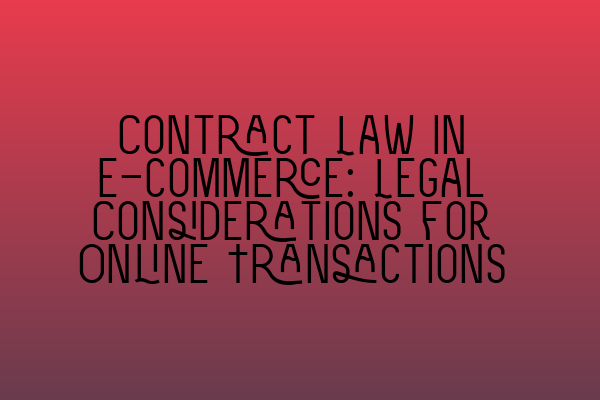Contract Law in E-commerce: Legal Considerations for Online Transactions
In today’s digital age, e-commerce has revolutionized the way businesses operate, allowing them to reach a global market with just the click of a button. However, along with the convenience and opportunities of online transactions come important legal considerations that must not be overlooked. Understanding contract law is essential for anyone involved in e-commerce, as it governs the relationships and obligations between parties in an online transaction. In this blog post, we will explore some key legal considerations in contract law for e-commerce and highlight their importance in ensuring smooth and legally sound online transactions.
1. Offer and Acceptance:
When it comes to online transactions, the concepts of offer and acceptance play a crucial role in establishing a valid contract. An offer is a definite proposal made by one party to another, indicating a willingness to enter into a contract. Acceptance, on the other hand, is the unequivocal and unconditional agreement to the terms of the offer. The terms of the offer and the acceptance must be clear, and both parties must have a mutual understanding of the terms and conditions of the contract.
2. Formation of Contract:
In traditional offline transactions, parties often rely on written agreements signed in ink. However, in the e-commerce landscape, contracts are often formed electronically. Electronic contracts are legally binding and enforceable, as long as the essential elements of a contract – offer, acceptance, consideration, and intention – are present. It is essential to have appropriate mechanisms in place to ensure the authenticity and integrity of electronic contracts, such as electronic signatures and timestamps.
3. Terms and Conditions:
Every e-commerce website should have clear and accessible terms and conditions that outline the rights and responsibilities of both the buyer and the seller. These terms and conditions must be drafted carefully to ensure they are fair and comply with relevant consumer protection laws. It is essential to clearly state important information such as pricing, shipping policies, return policies, and limitations of liability. Implementing transparency and ensuring that terms and conditions are easily accessible to users is vital to build trust and avoid future disputes.
4. Consumer Protection:
In e-commerce, consumer protection is of utmost importance. Consumers should have rights and protections in place, especially when purchasing goods or services online. Laws and regulations such as the Consumer Rights Act 2015 provide consumers with remedies, such as the right to cancel a contract within a specified cooling-off period and the right to a refund for faulty or misrepresented products. It is crucial for businesses to understand and comply with these consumer protection laws to maintain a positive reputation and avoid legal issues.
5. Privacy and Data Protection:
E-commerce transactions often involve the collection and processing of personal data, such as names, addresses, and payment information. As an online business, you have a legal obligation to protect the privacy and data of your customers. It is crucial to have a privacy policy that outlines how personal data is collected, processed, and stored. Complying with data protection laws, such as the General Data Protection Regulation (GDPR), is essential to safeguard customer information and avoid costly penalties.
6. Dispute Resolution:
Even with the best intentions and clear contracts, disputes may still arise in e-commerce transactions. It is important to have mechanisms in place for resolving disputes efficiently and effectively. A well-drafted dispute resolution clause can stipulate the preferred method of resolving disputes, such as negotiation, mediation, or arbitration. Properly addressing dispute resolution in your contracts can save time, money, and potential damage to your business reputation.
In conclusion, understanding contract law and its implications for e-commerce is vital for successful and legally compliant online transactions. From offer and acceptance to clear terms and conditions, consumer protection, privacy, and dispute resolution, every aspect of contract law plays a crucial role in shaping a robust legal framework for e-commerce. By prioritizing these legal considerations and seeking the advice of qualified solicitors, businesses can navigate the complexities of contract law in e-commerce, protect their interests, and build trust with customers.
For more information on related topics, you may find these articles helpful:
– Interpreting Contractual Clauses: Unlocking the Hidden Meanings
– Contract Law Tutorials: Simplifying Complex Concepts for Students
– Discharge of Contracts: Modes and Consequences Explained
– Exploring Third Party Rights in Contract Law: Implications and Boundaries
– Contractual Obligations: Navigating the Responsibilities of Parties
Remember, seeking professional legal advice specific to your circumstances is always advisable to ensure compliance with the law.
